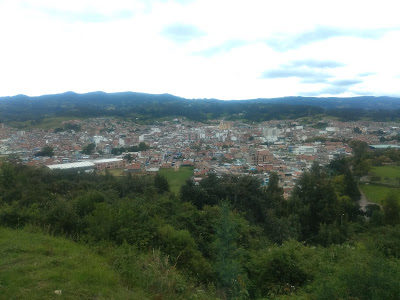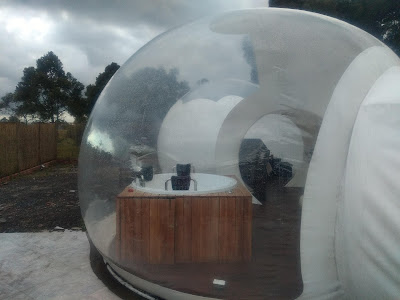[Listen to an audio version of this blog entry here.]
So the last bastion of conservatism and right-wing populism in Latin America has fallen. Colombia has chosen a leftist president for the first time in its history.
 |
| A new dawn for Colombia? Gustavo Petro and Francia Marquéz celebrate their historic election win. (Photo from Facebook.) |
The rains that fell incessantly on the capital city, Bogotá, as the results flooded in on Sunday 19 June were most likely viewed as cleansing waters from the heavens for supporters of now president-elect Gustavo Petro. Indeed, in a tweet, he did put the victory down to 'God and the citizens and their history (or story).'
In fairness, both Petro and the surprise-package challenger in this run-off contest, 77-year-old Rodolfo Hernández who ran on a strong anti-corruption ticket, were representing a change of sorts. Hernández — or the more affectionate Rodolfo as he goes by — was hardly mentioned as a serious contender a month or so out from the first election on 29 May.
His social media campaigning was Trumpesque, making particular use of TikTok. The plan for the former mayor of Bucaramanga appeared to be, 'don't give too much away and just say what many want to hear'. It nearly produced the hoped-for effect.
Petro, on the other hand, has been in the national political limelight for quite some time. Alongside his highly divisive guerilla involvement in the 1970s and '80s, he was elected to Colombia's lower house of Congress in 2002, became a senator in 2006 and won the Bogotá mayor's office in 2012. He also previously ran for president in 2010 and 2018.
As a far-from-euphoric taxi driver who voted for the winner told me, it was a case of opting for the least-bad candidate. Or, to borrow from a saying in these parts, to avoid going from Guatemala to Guatepeor — from bad to worse, basically.
A dramatic disruptor in the mould of Hugo Chávez, he is unlikely to be, however. Yes, he and, to an even greater extent, his vice president, the Afro-Colombian environmentalist and human-rights activist Francia Marquéz, represent something quite removed from those of the old Conservative/Liberal heritage who have dominated these offices before.
Yet, the idea that they'll tear down the existing state structures and construct an entirely new system seems somewhat farfetched.
The term, which begins on 07 August, is, after all, limited to four years with reelection constitutionally prohibited. What an administration with a potentially radical programme — and much to do with it — can achieve in such a timeframe in a rather legalistic country is open to debate.
Thus, paving the way for a successor will most likely be a high priority. The 'Petro Plan' is going to need more than four years to deal with the likes of deep-rooted inequality, to name just one of the country's many ills.
As outgoing President Iván Duque discovered in 2021 with his tax-reform proposals — a perennial problem here — opposition in Colombia can be fierce and bring together disparate sections of society.
Mentioning Duque, when he hands over the reins to Petro he'll have just turned 46. One gets the feeling, however, that he'll be happy to end his career in Colombian politics when he vacates Casa de Nariño, unlike his mentor, the president from 2002 to 2010, Álvaro Uribe.
Whatever lies in store for Duque, these next four years for Colombia are certainly set to be intriguing.
While many thought it would never happen, Petro's big moment has arrived. For sure, he'll face many obstacles as, it would appear, about half the country won't want him to succeed, some of whom wield considerable power in various influential spheres.
Yet, for the other half, he is the president they have been waiting for to make what they see as the necessary changes to finally improve their lot.
It's now time to deliver, Presidente Petro. Your enemies aren't willing to stay in the cold for long.
_______________________________________________________________
Listen to Wrong Way's Colombia Cast podcast here.
Facebook: Wrong Way Corrigan — The Blog & IQuiz "The Bogotá Pub Quiz".
New Colombia
For those who loathe the former rebel — and there are many in that category — the dreary weather must have felt like pathetic fallacy, heralding a decadent, possibly very unstable era.In fairness, both Petro and the surprise-package challenger in this run-off contest, 77-year-old Rodolfo Hernández who ran on a strong anti-corruption ticket, were representing a change of sorts. Hernández — or the more affectionate Rodolfo as he goes by — was hardly mentioned as a serious contender a month or so out from the first election on 29 May.
His social media campaigning was Trumpesque, making particular use of TikTok. The plan for the former mayor of Bucaramanga appeared to be, 'don't give too much away and just say what many want to hear'. It nearly produced the hoped-for effect.
Petro, on the other hand, has been in the national political limelight for quite some time. Alongside his highly divisive guerilla involvement in the 1970s and '80s, he was elected to Colombia's lower house of Congress in 2002, became a senator in 2006 and won the Bogotá mayor's office in 2012. He also previously ran for president in 2010 and 2018.
'A taxi driver who voted for the winner told me it was a case of opting for the least-bad candidate. Or, to borrow from a saying in these parts, to avoid going from Guatemala to Guatepeor.'This familiarity may have actually been a significant factor in getting Petro over the line this time. The loose-cannon nature of Rodolfo that displayed itself on numerous occasions worked to his rival's advantage.
As a far-from-euphoric taxi driver who voted for the winner told me, it was a case of opting for the least-bad candidate. Or, to borrow from a saying in these parts, to avoid going from Guatemala to Guatepeor — from bad to worse, basically.
Petrograd
The concerns of those against Petro are in relation to what is seen as his socialist agenda. 'He'll turn Colombia into another Venezuela', that's the common mantra.A dramatic disruptor in the mould of Hugo Chávez, he is unlikely to be, however. Yes, he and, to an even greater extent, his vice president, the Afro-Colombian environmentalist and human-rights activist Francia Marquéz, represent something quite removed from those of the old Conservative/Liberal heritage who have dominated these offices before.
Yet, the idea that they'll tear down the existing state structures and construct an entirely new system seems somewhat farfetched.
The term, which begins on 07 August, is, after all, limited to four years with reelection constitutionally prohibited. What an administration with a potentially radical programme — and much to do with it — can achieve in such a timeframe in a rather legalistic country is open to debate.
Thus, paving the way for a successor will most likely be a high priority. The 'Petro Plan' is going to need more than four years to deal with the likes of deep-rooted inequality, to name just one of the country's many ills.
As outgoing President Iván Duque discovered in 2021 with his tax-reform proposals — a perennial problem here — opposition in Colombia can be fierce and bring together disparate sections of society.
Mentioning Duque, when he hands over the reins to Petro he'll have just turned 46. One gets the feeling, however, that he'll be happy to end his career in Colombian politics when he vacates Casa de Nariño, unlike his mentor, the president from 2002 to 2010, Álvaro Uribe.
Whatever lies in store for Duque, these next four years for Colombia are certainly set to be intriguing.
While many thought it would never happen, Petro's big moment has arrived. For sure, he'll face many obstacles as, it would appear, about half the country won't want him to succeed, some of whom wield considerable power in various influential spheres.
Yet, for the other half, he is the president they have been waiting for to make what they see as the necessary changes to finally improve their lot.
It's now time to deliver, Presidente Petro. Your enemies aren't willing to stay in the cold for long.
_______________________________________________________________
Listen to Wrong Way's Colombia Cast podcast here.
Facebook: Wrong Way Corrigan — The Blog & IQuiz "The Bogotá Pub Quiz".






